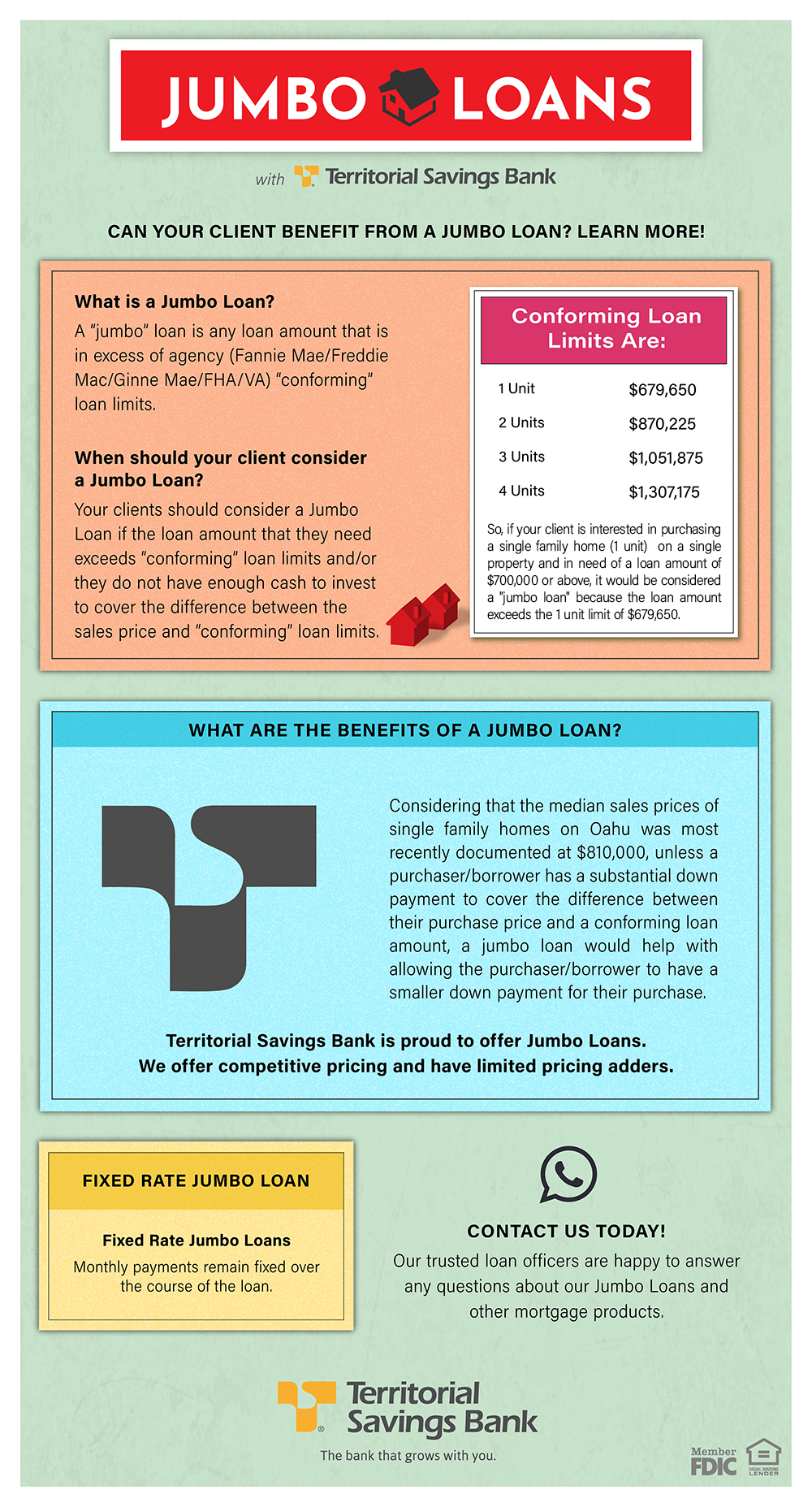Optimize Your Purchasing Power with a Jumbo Loan for High-End Homes
Optimize Your Purchasing Power with a Jumbo Loan for High-End Homes
Blog Article
Navigating the Jumbo Lending Landscape: Necessary Insights for First-Time Homebuyers
Browsing the intricacies of jumbo fundings provides an unique set of difficulties for novice buyers, specifically in a progressing property market. Understanding the vital eligibility demands and possible benefits, along with the disadvantages, is vital for making notified choices. Additionally, developing a solid economic approach can dramatically enhance your leads. Involving with specialists in the area can illuminate paths that may initially seem discouraging. Yet, as you discover these intricacies, it becomes clear that a much deeper understanding can reveal chances that may otherwise be forgotten. Exactly how can you ideal position yourself for success in this specialized sector of borrowing?
Recognizing Jumbo Fundings

Due to the fact that big lendings are not backed by government-sponsored entities, they carry different underwriting criteria and call for even more detailed monetary documentation. This distinction can cause greater rate of interest contrasted to traditional finances, given the raised threat to loan providers. Big fundings also supply special advantages, such as the capacity to fund higher-value residential or commercial properties and possibly much more flexible terms.
Newbie property buyers ought to also be aware that safeguarding a jumbo financing often demands a larger down settlement, commonly ranging from 10% to 20%. In addition, customers are usually expected to show solid creditworthiness and a steady income to qualify. Comprehending these subtleties can empower newbie homebuyers to make educated choices when exploring jumbo financing options in their quest of homeownership.
Qualification Needs
Protecting a big lending calls for conference particular eligibility needs that differ considerably from those of traditional lendings. Unlike standard lendings, which are commonly backed by government-sponsored entities, jumbo financings are not insured or guaranteed, resulting in stricter criteria.
In addition, customers should show a durable financial profile, which consists of a low debt-to-income (DTI) proportion, normally no higher than 43%. This makes certain that customers can manage their monthly repayments together with other economic obligations.
Furthermore, most lending institutions need considerable documentation, consisting of proof of revenue, property statements, and income tax return for the previous two years. A significant deposit is likewise vital; while conventional loans might allow deposits as low as 3%, big loans typically require at the very least 20%, depending upon the lender and the financing quantity.

Benefits of Jumbo Fundings
For several new homebuyers, jumbo loans provide distinct advantages that can help with the journey toward homeownership. One of the primary benefits is the ability to finance residential or commercial properties that surpass the adapting financing restrictions established by government-sponsored entities. This adaptability makes it possible for customers to access a broader array of high-value buildings in affordable genuine estate markets.
Furthermore, jumbo lendings frequently come with eye-catching rate of interest that can be lower than those of conventional lendings, especially for consumers with solid credit rating profiles. This can result in substantial financial savings over the life of the finance, making homeownership a lot more budget friendly. Big lendings commonly enable for greater funding amounts without the demand for private home mortgage insurance (PMI), which can additionally reduce total costs and regular monthly payments.

Possible Drawbacks
Many potential homebuyers might locate that jumbo financings come with substantial downsides that call for cautious factor to consider. One of the main issues is the strict qualification criteria. Unlike conforming car loans, jumbo car loans normally need go higher credit history, commonly exceeding 700, and significant earnings paperwork, making them less obtainable for some customers.
Furthermore, jumbo car loans generally feature higher rate of interest compared to conventional loans, which can bring about enhanced regular monthly settlements and total loaning prices. This premium might be especially troublesome for new homebuyers that are already browsing the financial complexities of buying a home.
One more noteworthy drawback is the bigger down repayment need. Numerous lending institutions expect a minimum down repayment of 20% or even more, which can present an obstacle for purchasers advice with restricted savings. Additionally, the absence of federal government backing for big car loans brings about less beneficial terms, enhancing the threat for lending institutions and, consequently, the loaning prices for property owners.
Last but not least, market fluctuations can considerably affect the resale worth of premium homes funded with big loans, adding a component of economic unpredictability that first-time property buyers may locate daunting.
Tips for First-Time Homebuyers
Navigating the complexities of the homebuying process can be overwhelming for first-time buyers, especially when thinking about jumbo finances (jumbo loan). To simplify this journey, sticking to some key techniques can make a considerable distinction
First, inform yourself on jumbo fundings and their certain demands. Comprehend the various loaning requirements, including credit rating, debt-to-income proportions, and down settlement assumptions. Usually, a minimum credit report of 700 and a deposit of at the very least 20% are necessary for authorization.
Second, engage with an educated home mortgage specialist. They can supply insights customized to your economic circumstance and help you browse the details of the jumbo financing landscape.
Third, consider pre-approval to reinforce your acquiring position. A pre-approval letter signals to vendors that you are a severe buyer, which can be useful in affordable markets.
Finally, do not ignore the relevance of budgeting. Consider all prices related to homeownership, including residential property tax obligations, upkeep, and home owners' insurance policy. By adhering to these tips, first-time buyers can come close to the big financing procedure with better self-confidence and quality, enhancing their opportunities of find more effective homeownership.
Final Thought
In final thought, navigating the big car loan landscape calls for a detailed understanding of eligibility requirements, benefits, and prospective drawbacks. Eventually, comprehensive prep work and education relating to jumbo lendings can lead to even more informed decision-making in the homebuying procedure.
When navigating the complexities of the real estate market, understanding jumbo loans is essential for new homebuyers intending for homes that go beyond conventional loan limitations. Big loans are non-conforming fundings that typically exceed the adapting loan limit set by the Federal Real Estate Money Firm (FHFA)Additionally, jumbo fundings usually come with eye-catching interest rates that can be lower than those of standard financings, especially for customers with strong debt profiles. Jumbo lendings usually enable for greater finance quantities without the need for personal home loan insurance policy (PMI), which can better lower total prices and regular monthly repayments.
Unlike adapting finances, big finances usually need higher credit score scores, typically surpassing 700, and substantial income documents, making them much less available for some customers.
Report this page